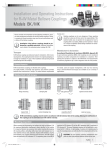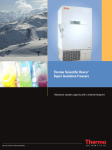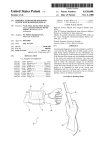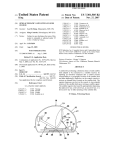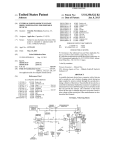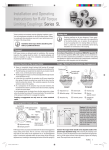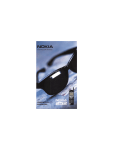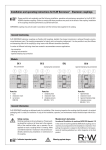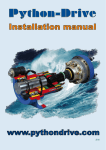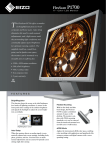Download INSTALLATION AND OPERATING INSTRUCTIONS FOR R+W
Transcript
INSTALLATION AND OPERATING INSTRUCTIONS FOR R+W METAL BELLOWS COUPLINGS MODELS BK / MK GENERAL FUNCTIONING Please carefully and completely read the following installation, operation and maintenance procedures for the R+W safety couplings. Failure to comply with these procedures may result in poor performance and/or failure of the bellows coupling. Installation of the bellows couplings should be performed by a qualified technician. Additional information can be found in the individual product catalog, BK / MK. TRANSPORT R+W bellows couplings are delivered ready for installation. After incoming inspection, the coupling should be stored in its original packaging until ready for installation. A copy of this installation and operating manual should be kept with the coupling. SAFETY ALERT Rotating couplings can be very dangerous. Proper guarding should be in place at all times and is the responsibility of the machine builder, user, or operator. Do not approach or touch a coupling while it is rotating. Make sure the machine is “locked out” and be accidentally started during installation or maintenance of the coupling. MANUFACTURER’S DECLARATION According to EG guidelines for machinery 2006/42/EG, Appendix IIB. As per machinery guidelines (MR), shaft couplings are not considered machines, but rather components for installation in a machine. Their putting into operation is subject to the fulfillment of all requirements of machinery regulations by or after integration into the final product. GENERAL FUNCTION R+W metal bellows couplings are flexible shaft couplings. The highly flexible, torsionally rigid stainless steel bellows provides backlash free transmission of torque. The metal bellows com- pensates for lateral, axial and angular misalignment, with very low restoring forces. Several different hub designs are available to suit a variety of applications. STANDARD HUB / SHAFT DESIGNS R+W metal bellows couplings must be used in accordance with the technical data in the catalog. Subsequent modification of the coupling is not recommended and will void the warranty. flange mounting tapered hub clamping hub conical clamping ring fully split hub tapered conical sleeve expanding radial set screw shaft MOUNTING PREPARATION When mounting and dismounting, the bellows may only be deformed 1.5x the maximum permissible misalignment values specified in the catalog. It is important to avoid any excessive force when mounting the coupling. All mounting surfaces including shafts, keys, bores and keyways must be clean and free of burrs, nicks, and dents. Inspect shaft diameters, coupling bore diameters, key / keyway dimensions and tolerances. All R+W coupling bores are machined to ISO tolerance H7. The expanding shaft of the MK3 is machined to ISO tolerance f7 and RW-COUPLINGS.COM the BK7 expanding shaft is machined to ISO tolerance h7. The overall clearance between the hub and shaft is maintained to 0.01 - 0.05 mm. A light coating of machine oil is recommended to ease the mounting process and will not affect the clamping force of the hub. Caution! Oils and greases containing molybdenum disulphide or other high pressure additives should not be used. 1 MOUNTING FLANGE: MODEL BK1 Mounting: The BK1 can be piloted with either the ID or OD of the coupling hub. Mount the coupling to the customer supplied flange and secure with mounting screws (2). Tighten the mounting screws to the correct tightening torque, supplied by the customer, with a torque wrench. Figure 9 Dismounting: Simply loosen the flange mounting screws and remove the coupling. outer pilot inner pilot CLAMPING HUB CONNECTION: MODEL BK2 / BKL / BKC / MK2 / BKH / MKH / BKM / BKS Mounting: Prior to mounting make sure that the shafts to be connected do not exceed the angular or lateral misalignment limits for the coupling to be used. This data can be found in the catalog. Slide the metal bellows coupling onto the motor shaft end. When the correct axial position has been reached, tighten the clamping screw (A) to the correct tightening torque as indicated in table 1 with a torque wrench. Insert the spindle shaft into the other end of the coupling to the proper axial position. Make sure that the coupling is free of any axial forces before tightening. Tighten the clamping screw (A) as above using a torque wrench to the proper tightening torque. For the split hub model, it is necessary to maintain the proper separation between shaft ends (dimension H in the catalog). Figure 10 A Spindle Motor A Caution! For the split hub design the shafts must extend into the coupling to the full width of the fully split clamping hubs. Dismounting: Simply loosen the clamping screws and remove the coupling. Spindle H split hub TAPERED CONICAL CONNECTION: MODEL BK3 Mounting: Prior to mounting make sure that the shafts to be connected do not exceed the angular or lateral misalignment limits for the coupling to be used. Slide the coupling onto the motor shaft to the proper axial position. Using a torque wrench tightening the clamping screws (B) in 3 steps with 1/3, 2/3 and full tightening torque in a circular pattern (not cross wise). Tightening torque of the clamping screws is shown in table 1. Motor Figure 11 B Spindle Motor Caution! Overtightening of the clamping screws (B) can cause damage. Dismounting: Loosen the clamping screws (B) evenly. Use the three removal jack screws to remove the conical sleeve. Pay attention to the equal force distribution of the removal jack screws. Grease on the jack screw heads will enhance the friction. This results in less force being required to remove the conical sleeve. Caution! Prior to re-assembly make sure the three jack screws (4) are turned back to their original position. TAPERED HUB CONNECTION: MODEL BK4 Mounting: Prior to mounting make sure that the shafts to be connected do not exceed the angular or lateral misalignment limits for the coupling to be used. This data can be found in the catalog. Slide the metal bellows coupling onto the motor shaft end. When the correct axial position has been reached, tighten the nut (5) to the correct tightening torque as specified by the customer with a torque wrench. Insert the second shaft into the other end of the coupling to the proper axial position. Using a torque wrench, uniformly tighten the clamping screws (B) using a cross-wise tightening pattern (as explained for the BK3) until all the clamping screws are evenly tightened to the correct tightening torque as specified in table 1. Dismounting: Remove the conical sleeve as described for the BK3. To dismount the other end, loosen the nut (5) that is axially securing the tapered shaft. Remove the tapered shaft with an appropriate tool. 2 Figure 12 Fanuc - Motor B 1:10 DIN 896 B RW-COUPLINGS.COM CONICAL CLAMPING RING CONNECTION: MODEL BK6 (AXIAL BLIND MATE) Mounting: The BK 6 uses a conical clamping with axial fastening screws. Slide the coupling half onto the motor shaft to the proper axial position. Using a torque wrench tighten the clamping screws (C) in 3 steps with 1/3, 2/3 and full tightening torque in a circular pattern (not cross wise). Tightening torque of the clamping screws are given in table 1. Figure 13 C Spindel Dismounting: Loosen the motor mounting screws. Remove the motor together with the male tapered segment. Loosen the clamping screws (C). Use the three jack screws (6) to „back off“ the conical clamping ring and remove the coupling. Evenly loosen the fastening screws (C) (approx. 2 complete turns) and back out the conical clamping ring with the removal jack screws (6). After removal, return the removal jack screws to their original position. Motor C EXPANDING SHAFT CONNECTION: MODELS BK7 / MK3 / MK6 Mounting: Completely insert the expanding shaft side of the coupling into the hollow bore. Using a torque wrench, tighten the clamping screw (D) to the proper tightening torque as indicated in table 1. Next insert the shaft end or encoder shaft into the other side of the coupling. Ensure that the shaft has been inserted to the proper axial position and that no residual axial forces remain on the coupling. Using a torque wrench, tighten the clamping screw (A) to the proper tightening torque as indicated in table 1. Figure 14 Hollow shaft A Dismounting: Simply loosen the clamping screws (A) and (D) and remove the coupling. It may be necessary to apply axial pressure to the clamping screw (D) to remove expanding shaft. D Hub length RADIAL SET SCREW CONNECTION: MODELS MK1 / MK4 Mounting: Slide the complete coupling onto the shaft end to the proper axial position. Using a torque wrench, tighten the set screw(s) (E) to the proper tightening torque as indicated in table 1. Insert the second shaft end to the proper axial position and ensure no residual axial forces exist on the coupling. Tighten the set screw(s) using the same procedure as on the first side. For series 10 and smaller couplings, each hub has one set screw, series 15 and larger have two set screws per hub, 120 degrees apart. - Series 10 and smaller: 1 x screw per hub - Series 15 and up: 2 x screws per hub, 120 degrees apart Figure 15 ISO 4029 E E E Dismounting groove Burr Dismounting: Simply loosen the set screw(s) (E) and remove the coupling. R+W couplings incorporate a unique dismounting groove that provides clearance for any burr caused by the setscrew (9). A shaft groove or flat is not required BLIND MATE CONNECTION: MODELS MK4 / MK5 / MK6 / BK5 / BK6 Mounting: A shaft groove or flat is not required. Prior to mounting it is necessary to take into consideration the overall length of the assembled coupling. The blind mate coupling requires a specific pre-tensioning (F) between the two coupling halves to ensure backlash free operation. Mount the ”female” bellows body onto the spindle shaft to the proper axial position. Tighten the clamping screw(s) per the mounting instructions for the coupling hub design. Mount the ”male” tapered segment onto the motor shaft. The proper axial position of the coupling segment on the motor shaft is when the motor is mounted and the coupling is compressed by the proper pre-tensioning value (F). When the coupling segment is properly positioned, tighten the clamping screw to the proper tightening torque using a torque wrench. The maximum misalignment values of the coupling will not be affected by the pre-tensioning. MK4 MK6 MK5 / BK5 BK6 press-fit length A RW-COUPLINGS.COM Figure 16 Miniature bellows coupling Single position (standard) Multi position Bellows coupling Multi position (standard) Single position Figure 17 Motor Spindle Pre-tensioning F 3 SCREW TIGHTENING TORQUE / PRE-TENSIONING SERIES MK 0.5 1 5 10 15 20 45 100 SERIES BKC / BKS 15 SERIES BKM 20 SERIES BKL 2 4,5 10 SERIES BK A B C D E F Clamping screws x x M2 Tightening torque (Nm) x x 0.43 0.43 0.85 2.3 Clamping screws x x x x x x Tightening torque (Nm) x x x x x Clamping screws x x x x Tightening torque (Nm) x x x Clamping screws x x Tightening torque (Nm) x x 60 150 200 400 80 300 500 1000 15 30 60 15 30 60 150 M5 M6 M8 M10 M10 M10 M10 M10 M12 M12 M12 M12 M16 M16 M20 M24 M24 M30 80 300 150 200 300 500 800 1500 4000 6000 10000 M4 M4 4 4.5 8 15 40 50 70 75 85 70 120 120 130 125 200 250 470 1200 1200 2400 x x M4 M5 M5 x x x x M6 M6 x M8 x M8 M10 M12 M16 M16 M16 x x x 4 6 8 x x x x 12 14 x 18 x 25 40 70 160 x x x x M4 M5 M5 x x x x M6 x x M8 x M8 x x x x x x x x x x 3.5 6.5 8 x x x x 12 x x 30 x 32 x x x x x M3 M3 M4 M4 M5 M6 M5 M6 M8 x x x x M10 x x M12 x x x x x x x 1.5 1.5 3 4 6.5 11 8 14 38 x x x x 65 x x 120 x x x x x x x M2 M2.5 M3 M3 M3 M4 M5 M6 x x x x x x x x x x x x x x x x x x Tightening torque (Nm) 0.35 0.75 1.3 1.3 1.3 2.5 4 6 x x x x x x x x x x x x x x x x x x x 0.5 0.5 0.7 1 0.5 0.7 1 1 x x x 1 x x 1 x 1.2 x x x x x Clamping screws Pre-tensioning approx.(mm) x x 0.4 M2 M2,5 M3 30 120 150 Table 1 MAXIMUM SHAFT MISALIGNMENTS R+W metal bellows couplings compensate for lateral, axial, and angular shaft misalignment simultaneously. In the section Technical Information within the product catalogs you will find the maximum permissible values for the three types of misalignment. It is important to remain within these limits to ensure long life and proper operation of the coupling. Caution! Lateral misalignment has a negative effect on the service life of the bellows. Exact alignment of the R+W metal bellows coupling considerably increases the service life of the coupling. By reducing or eliminating lateral misalignment, the radial load on the adjacent bearings is eliminated while increasing service life and reducing heat. Lateral misalignment ∆ Kr Axial misalignment ∆ Ka Angular misalignment ∆ Kw For high speed applications, we recommend aligning the R+W coupling with dial indicators or a laser alignment tool. INSTALLATION WITH INTERMEDIATE FLANGE OPEN INSTALLATION If an R+W metal bellows coupling is to be installed within an intermediate flange, it is important that the drive and driven shafts are aligned as precisely as possible. The flange must be precision machined with centering pilots, and the mounting surfaces must be parallel to each other and perpendicular to the shaft axis. Figure 19 If the R+W coupling is to be mounted between a foot mounted motor and a gearbox, please take extra care during installation. Ensure that the gearbox and motor shafts are properly aligned and the devices are permanently mounted. Figure 20 Spindle centering pilot Intermediate flange is fixed Motor Motor Spindle Spindel dial indicator Magnetic base MAINTENANCE R+W Antriebselemente GmbH Alexander-Wiegand-Str. 8 · 63911 Klingenberg Phone +49 9372 9864-0 · Fax +49 9372 9864-20 [email protected] · www.rw-couplings.com 4 The above-mentioned information is based on our present knowledge and experiences and does not free the user of his own regular checks. A legally binding guarantee is not given even in regard to protection rights of third parties. RW-COUPLINGS.COM 11/2014/7500 R+W metal bellows couplings are maintenance free as long as they are properly mounted and the maximum misalignment values are not exceeded.




